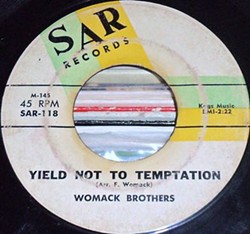By the late '40s, a new wave of brash young quartet-style gospel singing emerged, distinct from the barbershop-ish chankalankalank of acts from the '30s and '40s. These new "hard gospel" acts were extremely flamboyant and intense, nattily dressed, cool, and often handsome. Cooke got his start in a tamer family group assembled by his father, then as a youngster he joined the Teenage Highway QCs. They regularly showed up at gospel programs and churches and stole the show.
Ministers began to complain at the attention the QCs got from female parishioners of all ages when Cooke had himself just hit puberty.
Among the most popular and forward-thinking quartets around was the Soul Stirrers, led at the time by R.H. Harris. In The Gospel Sound, Tony Heilbut writes that R.H. Harris & the Stirrers "simply created the entire gospel quartet tradition," which is just a bit of an oversimplification. Recent research by gospel historian Doug Seroff has found that Harris might likely not have been the first group leader to institute the double-lead tradition in which two singers double off on lead vocals, at times even trading back and forth word for word. Harris doubtless popularized this more than anyone else, as he made the Soul Stirrers into the pre-eminent gospel quartet in the country, and he ingeniously timed his own singing off the beat to create a complex mass of shouted vocal interplay.
Harris contends that he left the Soul Stirrers because the group had strayed too far from church teachings. As Bobby Womack explained it to VH1 for their Say It Loud special, "Traveling around, R.H. Harris got to a point where he couldn't perform in different cities because he was always under arrest for child support. He had children everywhere. You take a guy like that into court and say, 'How could this guy be in all these places?' They'd say, 'He does one-nighters onstage and one-nighters with the women.' It got so bad that he couldn't go on the road anymore. That's when he got Sam to replace him. He was giving Sam voice lessons, and he said, 'This kid would be good for the group. He can travel.'"
The main thing that differentiated Cooke is that he led a modern gospel band in the shouting era but he never shouted, himself. An anonymous fan on eMusic (where I used to have a monthly gospel column) wrote that Cooke had this very crowd-pleasing, lady-killing style full of vibrato and melisma, and he also offered impeccable diction, bent notes that traded on their poignancy for power. Young women began to show up to their performances and go crazy whenever Sam stepped to the mic — even before he opened his mouth. The group's image became far more a part of the show now, the band all dressing nattily in white silk suits. He also brought in a full backing band; within months, other acts copied both moves.
I want to quote Bobby Womack again, singer and guitarist for a number of gospel acts at the time, including the Five Blind Boys. Womack was in awe of the singer, often seen as his protégé; he not only wound up later recording for Cooke's SAR record label, but even married Cooke's wife Barbara mere months after Cooke's death. "There would be loads and loads of young pretty women, all there to see Sam. It was like a rock 'n' roll show. The preachers didn't like it, but they liked the fact that he was able to draw the younger generation in the church.
VH1: So was Sam like gospel's first sex symbol?
Womack: I think so. He was a good-looking guy, and chicks chased him to the car just like they would be chasing some big rock star today. They was constantly chasing him. He would turn around and chase them back! Onstage, he would play with them. He would look at women and wink, go down and touch them on the knee. They loved it.







